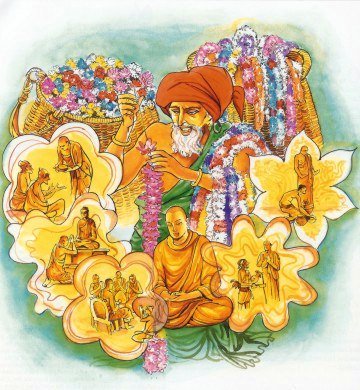As from a mass of flowers
many a garland may be made,
so by one born mortal
should many good deeds be done.
Explanation: The deft maker of garlands takes a variety of flowers. Out of these he creates garlands of different strands and variegated arrangements. In the same way, those who are born into this world should, out of their lives, create good, wholesome, meritorious actions of a vast variety.
The Story of Visakha (Verse 53)
While residing at the Pubbarama Monastery in Savatthi, the Buddha spoke this verse, with reference to Visakha, the famous donor of the Pubbarama Monastery. Visakha was the daughter of a rich man of Bhaddiya, named Dhananjaya, and his wife Sumanadevi, and the granddaughter of Mendaka, one of the five extremely wealthy men of King Bimbisara’s dominions. When Visakha was seven years old, the Buddha came to Bhaddiya. On that occasion, the rich man Mendaka took Visakha and her five hundred companions with him to pay homage to the Buddha. After hearing the discourse given by the Buddha, Visakha, her grandfather and all her five hundred companions attained sotapatti fruition. When Visakha came of age, she married Punnavaddhana, son of Migara, a fairly rich man from Savatthi.
One day, while Migara was having his meal, a monk stopped for alms at his house; but Migara completely ignored the monk. Visakha, seeing this, said to the monk. I am sorry, your reverence, my father-in-law only eats left-overs. On hearing this, Migara flew into a rage and told her to leave his house. But Visakha said she was not going away, and that she would send for the eight elderly rich men who were sent by her father to accompany her and to advise her. It was for them to decide whether she was guilty or not. When the elders came, Migara told them the story. The elders decided that Visakha was not guilty. Visakha then said that she was one who had absolute and unshakable faith in the Teaching of the Buddha and so could not stay where the monks were not welcome; and also, that if she was not given permission to invite the monks to the house to offer alms-food and make other offerings, she would leave the house. So permission was granted her to invite the Buddha and his monks to the house.
The next day, the Buddha and his disciples were invited to the house of Visakha. When alms-food was about to be offered, she sent word to her father-in-law to join her in offering food; but he did not come. When the meal was over, again, she sent a message, this time requesting her father-in-law to join her in hearing the discourse that would soon be given by the Buddha. Her father-in-law felt that he should not refuse for a second time. But his ascetic teachers, the Niganthas, would not let him go, however, they conceded that he could listen from behind a curtain. After hearing the Buddha’s discourse Migara attained sotapatti fruition. He felt very thankful to the Buddha and also to his daughter-in-law. Being so thankful, he declared that henceforth Visakha would be like a mother to him, and Visakha came to be known as Migaramata.
Visakha gave birth to ten sons and ten daughters, and ten sons and ten daughters each were born to everyone of her children and grand-children. Visakha possessed an immensely valuable gem-encrusted ornament given by her father as a wedding present. One day, Visakha went to the Jetavana Monastery with her entourage. On arrival at the Monastery, she found her bejewelled ornament too heavy. So, she took it off, wrapped it up in her shawl, and gave it to the maid to hold. The maid absent-mindedly left it at the Monastery. It was the custom for the Venerable Ananda to look after the things left by any one of the lay disciples. Visakha sent the maid back to the Monastery saying, “Go and look for the bejewelled ornament, but if the Venerable Ananda had already found it and kept it in a place do not bring it back; I donate the bejewelled ornament to the Venerable Ananda.” But the Venerable Ananda did not accept her donation. So Visakha decided to sell it and donate the sale proceeds. But there was no one who could afford to buy that ornament. So Visakha bought it back for nine billion and one lakh. With this money, she built a monastery on the eastern side of the city; this monastery came to be known as Pubbarama.

